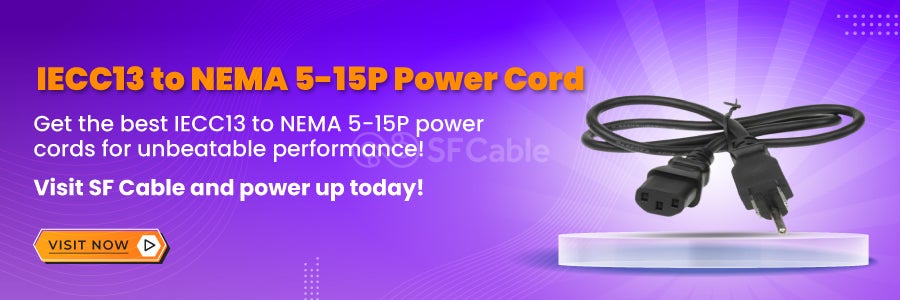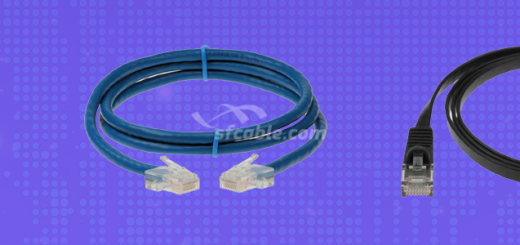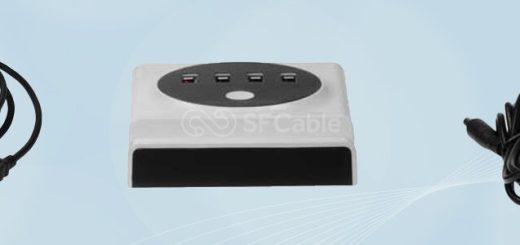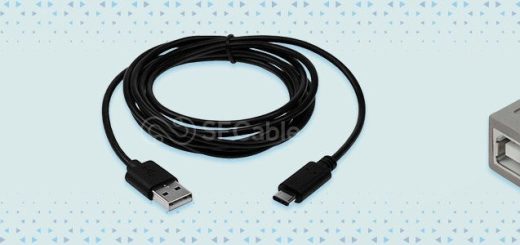Everything You Must Know About Power Cord: The IECC13 To NEMA 5-15P
Power cords are an integral part of our lives because they connect electronic devices to power sources that are required for them to operate.
An example is the IECC13 to NEMA 5-15P power cord, which is prevalent in most domestic and commercial products. This power cord guarantees a good connection, which is essential for helping your appliances work as expected.
These facts and purposes of this cord enable one to make appropriate decisions in connecting or replacing the equipment.
Thus, in this blog, we will focus on the major aspects of the IECC13 to NEMA 5-15P power cord, including its major facts and features.
It will also include design, compatibility, and why many device makers opt for it. Here you will come to understand the said power cord type and the role it plays by the end of this article.
What is an IECC13 to NEMA 5-15P Power Cord?
IECC13 Connector
An IEC C13 connector is a three-hole socket found at the end of power cables used for computers, monitors, printers, and other similar devices.
It is rectangular with a small hole at the top, which ensures it fits correctly when plugged into the device. This connector is commonly found in data centers and offices where power connections for IT equipment must be secure.
It is rated for up to 10 amps and 250 volts, enough to power different electrical appliances in the home.
To avoid slippage, the IEC C13 is designed to be plugged directly into an IEC C14 inlet. Their application in computing and business settings underscores their role in fueling common electrical equipment.
NEMA 5-15P Plug
The NEMA 5-15P is an industrial electrical plug with two flat parallel blades and a round pin.
It is commonly used in power cables for home electronics, office machines, and countless other uses. This plug is intended for 15-amp circuits and 125-volt power, which is ideal for most residential and light business usage.
The grounding pin is an added safety measure that helps reduce the chances of an electric shock. This is a simple type of power cord that is compatible with any standard wall outlet, making it a favorite with many people.
It is also known as the NEMA 5-15P and is found in homes and offices throughout the North American region.
How These Two Components Combine to Form a Power Cord?
Combining the IEC C13 connector and NEMA 5-15P plug creates a universal power cord that translates international and local power standards. This system enables devices with an IEC C14 inlet to plug into standard North American wall sockets.
It is particularly useful if the equipment is designed for general use in the global market and has to be powered in the United States or Canada.
The power cord offers a strong connection to protect electrical appliances so that they can work efficiently again.
When combined, these two components enable manufacturers to develop practical power cords that can be used by many people. This versatility makes such power cords important in home and commercial use scenarios.
Key Features of IECC13 Connector and NEMA 5-15P Plug
1. Voltage and Current Ratings
The IECC13 connector and NEMA 5-15P plug protect the device from voltages and currents that are too high for its rating.
IECC13 connector usually has a current capacity of 10A × 250V AC, whereas the NEMA 5-15P plug has a capacity of 15A × 125V AC.
These ratings mean that the connectors will be capable of carrying the electrical load of most domestic and office-use appliances without causing the connectors to overheat.
connectors used must be of correct voltage and current to avoid hazards like electrical shocks and short circuits.
Adding these ratings in the IECC13 and NEMA 5-15P makes this outlet compatible with almost any electrical appliance.
Thus, always verify the ratings before applying to ensure they meet the equipment specifications.
2. Length Variations and Standard Lengths Available
Different lengths of connectors and plugs used in IECC13 and NEMA 5-15P are available in different sizes for various uses and installations.
Standard bars usually come along standard lengths from 1 to 5 meters to allow for setup versatility.
Big cable is great for long runs to the power supply, while less cable is great for minimizing the number of runs in compact setups.
Additional cuts can also be made to any other length to fit a particular installation, thus making everything as neat as possible. Given that the cable has several lengths, users can select the most appropriate for a given environment.
These are some features that make it appropriate for use in both residential and other commercial applications.
3. Material and Build Quality
The build quality of these connectors mainly determines the durability and safety of IECC13 connectivity and NEMA 5-15P plug connectors.
These connectors are most commonly constructed from high-grade plastic and metal parts that can handle constant use without degrading.
The materials used are usually flame-retardant and impact-resistant to enable the connectors to work in any environment.
Good quality connectors do not break by accident and avoid electrical failures to a large extent. This prevents the occurrence of loose connections that inevitably lead to heat dissipation due to poor contact of the connectors.
Well-built products provide durability and, hence, can sustain a high level of performance for a longer period.
4. Certification and Compliance Standards
IECC13 connectors and NEMA 5-15P plugs require several certifications and compliances in order to meet the required level of safety and quality.
Some of the commonly used certifications are UL, which stands for Underwriters Laboratories, and RoHS, which stands for Restriction of Hazardous Substances.
UL certification helps to prove that the connectors are safe and have been thoroughly tested for reliability.
RoHS compliance confirms that the connectors do not contain lead or banned substances, which means that they have no negative impact on the environment.
These certifications ensure users have confidence in the products’ safety and environmental effects. Adherence to these standards is crucial for legal and, perhaps, safety considerations.
Common Applications of IECC13 Connector and NEMA 5-15P Plug
1. Consumer Electronics
The IEC C13 connector and NEMA 5-15P plug are typically used to power electronics such as computer systems, monitors, and printers.
These devices depend on such a connector and plug since they are easily available and offer a stable connection to standard home outlets. This arrangement guarantees that various gadgets can be connected and operated without requiring sophisticated apparatus.
2. Industrial Equipment
The IEC C13 connector and NEMA 5-15P plug are used in light-duty applications and, most commonly, industrial applications for lab equipment.
These connectors are particularly useful for devices that are not usually required to handle complex power demands but need to operate safely and efficiently.
They are useful since they provide a standardized procedure for connecting the equipment to power sources, easing the process of installation and maintenance in factories.
3. Office Equipment
Most office equipment, such as power strips and desktop devices, employs an IEC C13 connector and NEMA 5-15P plug.
These connectors are ideal for office spaces since they are compatible with conventional sockets while powering different office equipment. This makes it easier to coordinate and arrange the common electronic devices in an office.
Conclusion
In conclusion, it is critical to be aware of the various aspects of a power cord for safety and efficiency.
We have discussed the IECC13 to NEMA 5-15P power cord, widely used in many home and office equipment. This type of cord connects to a normal wall socket to supply power to the device.
Selecting the right power cord means your devices run optimally, and the probability of electrical mishaps is minimized.
You must read your devices’ specifications and find the right power cord for each one. In doing so, you can maintain the integrity and effectiveness of your respective equipment.
It is always important to ensure that you use good-quality power cords to protect your electrical appliances and avert danger.



